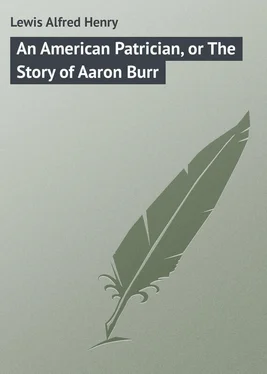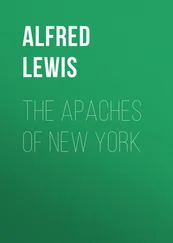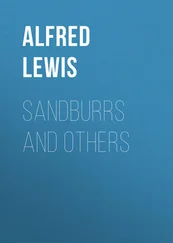Alfred Lewis - An American Patrician, or The Story of Aaron Burr
Здесь есть возможность читать онлайн «Alfred Lewis - An American Patrician, or The Story of Aaron Burr» — ознакомительный отрывок электронной книги совершенно бесплатно, а после прочтения отрывка купить полную версию. В некоторых случаях можно слушать аудио, скачать через торрент в формате fb2 и присутствует краткое содержание. ISBN: , Жанр: foreign_prose, foreign_language, на английском языке. Описание произведения, (предисловие) а так же отзывы посетителей доступны на портале библиотеки ЛибКат.
- Название:An American Patrician, or The Story of Aaron Burr
- Автор:
- Жанр:
- Год:неизвестен
- ISBN:http://www.gutenberg.org/ebooks/51911
- Рейтинг книги:4 / 5. Голосов: 1
-
Избранное:Добавить в избранное
- Отзывы:
-
Ваша оценка:
- 80
- 1
- 2
- 3
- 4
- 5
An American Patrician, or The Story of Aaron Burr: краткое содержание, описание и аннотация
Предлагаем к чтению аннотацию, описание, краткое содержание или предисловие (зависит от того, что написал сам автор книги «An American Patrician, or The Story of Aaron Burr»). Если вы не нашли необходимую информацию о книге — напишите в комментариях, мы постараемся отыскать её.
An American Patrician, or The Story of Aaron Burr — читать онлайн ознакомительный отрывок
Ниже представлен текст книги, разбитый по страницам. Система сохранения места последней прочитанной страницы, позволяет с удобством читать онлайн бесплатно книгу «An American Patrician, or The Story of Aaron Burr», без необходимости каждый раз заново искать на чём Вы остановились. Поставьте закладку, и сможете в любой момент перейти на страницу, на которой закончили чтение.
Интервал:
Закладка:
Young Aaron, from his beardless five feet six inches, looks up at the tall Virginian, and cannot avoid envying him his door-wide shoulders and that extra half foot of height. He perceives, too, with a resentful glow, that he is being mocked. However, he controls himself to answer coldly:
“As you surmise, sir, I have made the rounds of your forces.”
“And having made them” – this ironically – “I trust you found all to your satisfaction.”
“As to that,” remarks young Aaron, “while I did not look to find trained soldiers, I think that a better discipline might be maintained.”
“Indeed! I shall make a note of it. And yet I must express the hope that, while you occupy a subordinate place, you will give way as little as may be to your perilous trick of thinking, leaving it rather to our experienced friend Putnam, here, he being trained in these matters.”
The old wolf killer takes advantage of this reference to himself, to help the interview into less trying channels.
“You were seeking me?” he says to the youthful critic of camps and discipline.
“I was seeking the commander in chief,” returns young Aaron, again facing Washington. “I came to ask permission to go with Colonel Arnold against Quebec.”
“Against Quebec?” repeats Washington. “Go, with all my heart!”
There is a cut concealed in that consent, to the biting smart of which young Aaron is not insensible. However, he finds in the towering manner of its delivery something which checks even his audacity. After saluting, he withdraws without added word.
“General,” observes Washington, when young Aaron has gone, “I fear I cannot congratulate you on your new captain.”
“If you knew him better, general,” protests the good-hearted old wolf killer, “you would like him better. He is a boy; but he has an old head on his young shoulders.”
“The very thing I most fear,” rejoins Washington. “A boy has no more business with an old head than with old lungs or old legs. It is unnatural, sir; and the unnatural is the wrong. I want only heads and shoulders about me that were born the same day. For that reason, I am glad your ‘gentleman volunteer’” – this with a shade of irony – “goes to Quebec with that turbulent Norwich apothecary, Arnold. The army will be bettered just now by the absence of these lofty spirits. They disturb more than they help. Besides, a tramp of sixty days through the Maine woods will improve such Hotspurs vastly. There is nothing like a six-hundred mile march through an unbroken wilderness, with a fight in the snow at the far end of it, to take the edge off beardless arrogance and young conceit.”
What young Aaron carries away from that interview, as an impression of the big commander in chief, crops out in converse with his former college chum, young Ogden. The latter, like himself, is attached to the military family of General Putnam.
“Ogden, we have begun wrong as soldiers – you and I!” says young Aaron. “By flint and steel, man, we should have commenced like Washington, by hoeing tobacco!”
“Now this is not right!” cries young Ogden, in reproof. “General Washington is a soldier who has seen service.”
“Why,” retorts young Aaron, “I believe he was trounced with Braddock.” Then, warmly: “Ogden, the man is Failure walking about in blue and buff and high boots! I read him like a page of print! He is slow, dull, bovine, proud, and of no decision. He lacks initiative; and, while he might defend, he is incapable of attacking. Worst of all he has the soul of a planter – a plantation soul! A big movement like this, which brings the thirteen colonies to the field, is beyond his grasp.”
“Your great defect, Aaron,” cries young Ogden, not without indignation, “is that you regard your most careless judgment as final. Half the time, too, your decision is the product of prejudice, not reason. General Washington offends you – as, to be frank, he did me – by putting a lower estimate on your powers than that at which you yourself are pleased to hold them. I warrant now had he flattered you a bit, you would have found in him a very Alexander.”
“I should have found him what I tell you,” retorts young Aaron stoutly, “a glaring instance of misplaced mediocrity. He is even wanting in dignity!”
“For my side, then, I found him dignified enough.”
“Friend Ogden, you took dullness for dignity. Or I will change it; I’ll even consent that he is dignified. But only in the torpid, cud-chewing fashion in which a bullock is dignified. Still, he does very well by me; for he says I may go with Colonel Arnold. And so, Ogden, I’ve but time for ‘good-by!’ and then off to make myself ready to accompany our swashbuckler druggist against Quebec.”
CHAPTER III – COLONEL BENEDICT ARNOLD EXPLAINS
IT is September, brilliant and golden. Newburyport is brave with warlike excitement. Drums roll, fifes shriek, armed men fill the single village street. These latter are not seasoned troops, as one may see by their careless array and the want of uniformity in their homespun, homemade garbs. No two are armed alike, for each has brought his own weapon. These are rifles – long, eight-square flintlocks. Also every rifleman wears a powderhorn and bullet pouch of buckskin, while most of them carry knives and hatchets in their rawhide belts.
As our rude soldiery stand at ease in the village street, cheering crowds line the sidewalk. The shouts rise above the screaming fifes and rumbling drums. The soldiers are the force which Colonel Arnold will lead against Quebec. Young, athletic – to the last man they have been drawn from the farms. Resenting discipline, untaught of drill, their disorder has in it more of the mob than the military. However, their eyes like their hopes are bright, and one may read in the healthy, cheerful faces that each holds himself privily to be of the raw materials from which generals are made.
Down in the harbor eleven smallish vessels ride at anchor. They are of brigantine rig, each equal to transporting one hundred men. These will carry Colonel Arnold and his eleven hundred militant young rustics to the mouth of the Kennebec. In the waist of every vessel, packed one inside the other as a housewife arranges teacups on her shelves, are twenty bateaux. They are wide, shallow craft, blunt at bow and stern, and will be used to convey the expedition up the Kennebec. Each is large enough to hold five men, and so light that the five, at portages or rapids, can shoulder it with the dunnage which belongs to them and carry it across to the better water beyond.
The word of command runs along the unpolished ranks; the column begins to move toward the water front, taking its step from the incessant drums and fifes. Once at the water, the embarkation goes briskly forward. As the troops march away, the crowds follow; for the day in Newburyport is a gala occasion and partakes of the character of a celebration. No one considers the possibility of defeat. Everywhere one finds optimism, as though Quebec is already a captured city.
Now when the throngs have departed with the soldiery, the street shows comparatively deserted. This brings to view the Eagle Inn, a hostelry of the village. In the doorway of the Eagle a man and woman are standing. The woman is dashingly handsome, with cheek full of color and a bold eye. The man is about thirty-five in years. He swaggers with a forward, bragging, gamecock air, which – the basis being a coarse, berserk courage – is not altogether affectation. His features are vain, sensual, turbulent; his expression shows him to be proud in a crude way, and is noticeable because of an absence of any slightest glint of principle. There is, too, an extravagance of gold braid on his coat, which goes well with the superfluous feather in the three-cornered hat, and those russet boots of stamped Spanish leather. These swashbuckley excesses of costume bear out the vulgar promise of his face, and guarantee that intimated lack of fineness.
Читать дальшеИнтервал:
Закладка:
Похожие книги на «An American Patrician, or The Story of Aaron Burr»
Представляем Вашему вниманию похожие книги на «An American Patrician, or The Story of Aaron Burr» списком для выбора. Мы отобрали схожую по названию и смыслу литературу в надежде предоставить читателям больше вариантов отыскать новые, интересные, ещё непрочитанные произведения.
Обсуждение, отзывы о книге «An American Patrician, or The Story of Aaron Burr» и просто собственные мнения читателей. Оставьте ваши комментарии, напишите, что Вы думаете о произведении, его смысле или главных героях. Укажите что конкретно понравилось, а что нет, и почему Вы так считаете.












